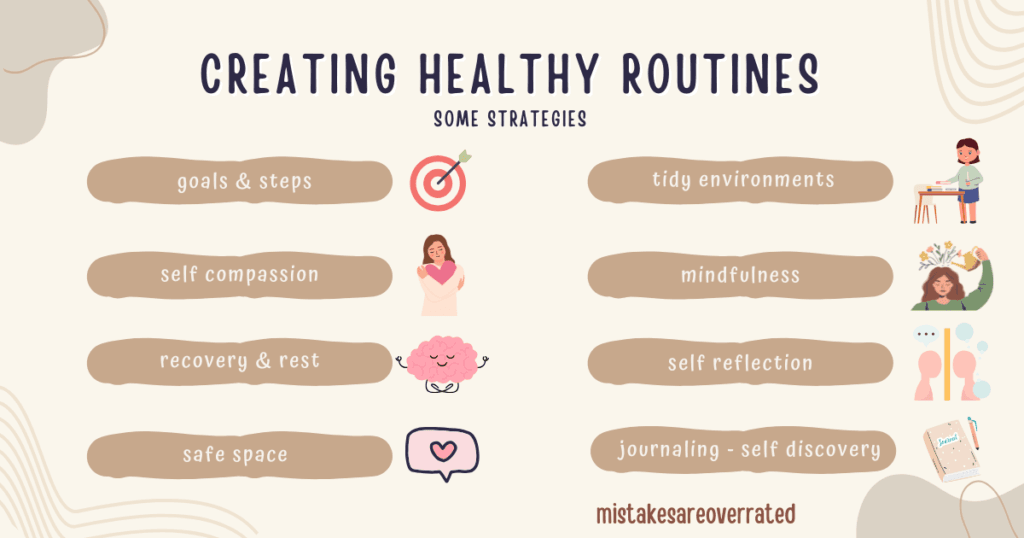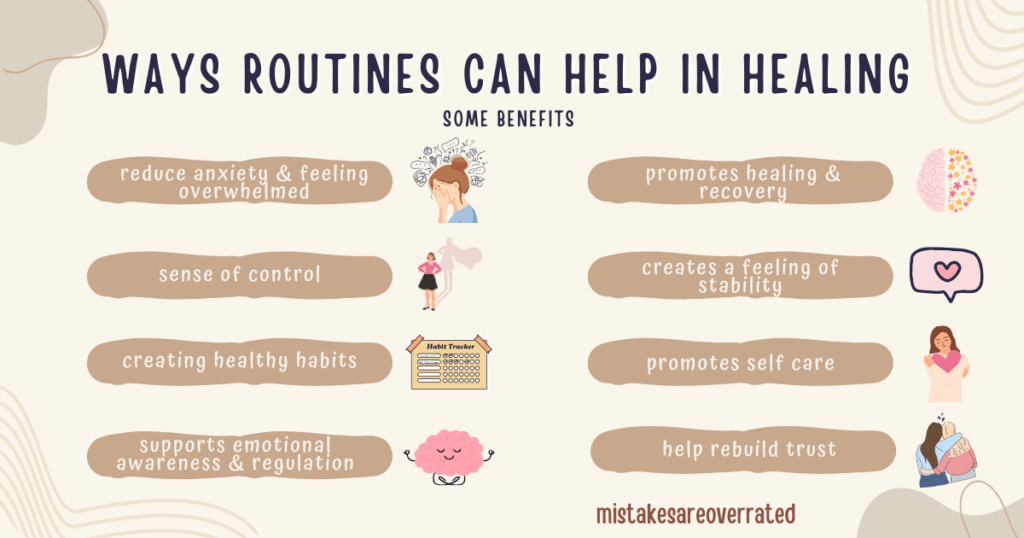creating routines after experiencing trauma can significantly help gain stability back into our lives and promote healing.
trauma can sometimes leave us feeling disconnected, lost and overwhelmed.
i found one of the most powerful tools for regaining stability and a sense of safety, was through creating routines.
when we feel like our life is out of our control, or everything feels uncertain, routines can offer a foundation of predictability.
i must say, this process requires time, effort and patience – but routines can gradually bring a sense of control and comfort back into our lives.
how to create and maintain a routine after experiencing trauma
after trauma, forming routines can help ground us in the present moment, whilst providing a safe space and the energy we need for healing.
you need to find a routine that works best for you in your healing journey – i suggest through trial and error.
trying out new ideas/activities until you find what you love and what helps you heal the most so you can apply them into your routine.
(remember, not everything will work for you, and that is completely okay! use these ideas as inspiration to try out, until you find what works best in your life)
these activities are what helped me when i began to establish a routine back in my life for my healing journey.

keeping a diary or a planner
this was my first step when i began to form a routine back into my life, and it helped me profusely.
there were 3 main components to my life planner:
1. to-do list – this was a detailed checklist of the plans throughout my day.
2. 3 priorities for my day – this ranged from things i must do that day, reminders to be kind to myself, people i appreciated – anything!
3. 3 things i loved about the day – this was my first step in showing gratitude.
i also had a section to write about my day – anything that stuck out to me, meant alot to me or just random stuff i thought about.
having a visualisation of what i wanted to do each day really help me stay on track and not get distracted.
sport or hobby
i always had a set in stone routine with my sport team, due to set training days and game days.
i personally believe finding a sport or hobby you are passionate about and actually love spending your time doing, is a key component in healing.
it made me feel safe, welcomed, a part of a family, dedicated, motivated and it brought me so much purpose.
try allocating a certain time within your week when you are free to consistently partake in your sport, hobby or activity each week.
work / life balance
having a work life balance is so crucial during your healing journey, (trust me i have experienced both sides – too much work and too little work).
this routine can change due to changing work days, holidays, casual work, ect – but try to figure out a schedule to fit around your work.
think of what you want to do before you start work, after you finish work, your boundaries around work, ect – a life planner comes in handy here.
make your lunch in the morning or the night before work? go for a walk before work or after work? family time 6pm tuesday’s so no overtime.
sleeping routines
establish a sleeping routine that works for you so you can stick to it.
again, i understand this can change due to late nights at work, children not falling asleep, going out with friends, ect.
having a set bedtime, a wake up time, having a certain night time ritual, reading a book – small acts like these can help form a sleeping routine.
i fell into a pretty solid sleeping schedule and by doing so i began to wake up more motivated and energetic.
(the weekends were for my friends/family time, so i was more lenient with my sleep).
sleep is especially important during trauma healing as we’re giving our bodies time to rest, replenishing our energy and lowering stress.
if you are struggling to fall asleep after trauma due to not being able to switch off your mind i have an in-depth article for you.
prioritising food
making a change with the foods we consume can truly make such a difference in the way we feel.
once i began prioritising my health and eating more healthy wholefoods, i noticed a big change in my mentality.
nourishing our bodies with the nutrients from healthier foods can help our energy levels, and having energy is so important during our healing time.
perhaps create a routine around food shopping and planning meals – this way you have an inkling of the meals to make during the week.
i must say, try not to do a gnarly diet or drastic change in the foods you eat, as the point of a routine is to stick to it.
so start with small changes in your food routine, and work your way up to your ideal healthy food routine.
body movement
moving our bodies is such an important aspect in our life, as it can help improve our physical and mental wellbeing.
finding ways you enjoy exercising is so important in being able to maintain a routine and stay consistent.
for me, i went on hikes and walks. i loved nature and the beach so i would go for hikes, coastal walks or beach strolls.
i used to only do at home workouts, but i slowly began going to the gym and after a while i really enjoyed it.
weight training, dancing, walks, swimming, cycling, group workouts, pilates, boxing, sport – find ways you love to move your body.
think of the days in your week you are less busy, the time of day you feel more motivated and have energy, and i suggest a progress tracker!
also pleaseeee know that within your routine, it is essential, if you are exhausted one day, rest – listen to your body.

goals and steps
having goals is an important aspect in life, but when creating routines, turning those goals into steps can make them more manageable.
start off with yearly goals – what would you like to accomplish?
then i broke those goals down into steps.
what can i do to achieve my goals on a monthly, weekly and daily basis.
this way i could create actionable steps towards my big goals within my routines.
example: yearly goal – eat healthier. monthly goal – look at progress tracker and reflect. weekly goal – sunday’s i plan my meals and food shop. daily goal – 2 home cooked meals and mark progress if i do it.
self compassion
self compassion allows you to create a relationship with yourself, one where you feel safe and supported.
implementing self compassion into my routine required the most effort in my experience.
if there was only one strategy i could suggest to try out when creating your routine, it would be self compassion.
i began by acknowledging and appreciating my achievements and things i was proud of myself for – wrote them down in my journal/planner.
writing self compassionate things and actually thinking them were 2 completely different things for me.
to gain self compassion within my daily routine, i had to actively switch my thoughts, and this took time and effort.
creating a habit of stopping my negative thoughts, pausing, and then swapping them for kinder thoughts, self compassion slowly became a part of my daily routine.
time for recovery and rest
while creating a routine to stick to, it is essential to allow yourself time for recovery and rest.
we need to have energy whilst healing from trauma, as we don’t want to burn ourselves out or constantly feel drained.
i was never okay with allowing myself time off, i was go-go-go.
but when i made it clear to myself that having ‘lazy’ days, or days of rest was okay, my healing increased.
i allowed myself to have time for my body to physically recover from my activities, and for my mind to heal and rest.
discovering your safe space
where do i feel safe, comfortable and at ease?
a safe space doesn’t necessarily have to be a physical space, it can also be non-physical.
it can be a mental picture of a place, an object, a song, a physical location, a support group, a person – however you feel safe.
whilst healing from trauma, it can be beneficial to frequently visit your safe space – especially during the harder times.
my safe space was the beach – i made it part of my routine to go there before or after work atleast twice a week, or during the harder days.
when i didn’t have the opportunity to go to the beach, my other safe space was writing.
i suggest figuring out 3 safe spaces, as we don’t always have the opportunity to go to our preferred safe space due to life circumstances.
tidy environments
getting caught up in life and healing can sometimes lead to us abandoning other aspects in our life, and in my case it was cleaning.
when i implemented a tidying/cleaning up routine in my life, my mind became clearer as i was in cleaner settings.
my daily routine consisted of making my bed as soon as i woke up, putting away what i got out and leaving no mugs, cups and bowls lying around.
then i created a weekly cleaning routine (for the bigger jobs).
having clean spaces felt like i had a clearer mentality, as i was driving in a clean car and entering a clean room with a made bed.
taking time for mindfulness
sticking to a mindfulness routine was probably one of the most challenging routines for me.
when i was figuring out my routine, i didn’t feel mindfulness helped at all as i would get distracted very easily.
but though my experience, i learnt that mindfulness is about setting into a rhythm.
start with a few minutes a day and then gradually increase the time as you become more comfortable.
this way you’re starting small and it can feel less overwhelming or like it’s ‘a chore’ to do.
i recommend choosing a place and a time of day that is the least busy, so you can create a consistent routine.
are you a morning person? or do you need to rush around to get ready for work in the morning?
are you a night time person? or are you exhausted by the time it’s night so you will forget to practise mindfulness?
also it is okay to change;
i began my mindfulness routine within my journaling routine, then changed it to my safe space routine and now it’s in my body movement routine.
self reflection
self reflection is one of the key components to self improvement and growth in life.
within your routine i highly suggest taking a time out of your day, or week, purely for self reflection.
this activity became an essential part of my routine immediately after the first time i trying it.
during this time i reflected on what i felt i needed to do more, do less, what i learnt, what was going well and what i needed to improve.
i chose to write in my journal or on a piece of paper for this, but you can reflect however you wish.
journaling prompts / self discovery
this wasn’t per-say a “routine”, but it was sooo essential within my self discovery and healing that i didn’t want to leave it out.
if i was struggling to understand something about myself, why i was feeling a certain way or confused about anything – i would write it out.
i would write at the top of the page what it was i was confused about, and allow myself to write anything that flowed out of me.
it became a routine in a sense that, instead of dwelling or suppressing my feelings, i would try to understand it.
8 ways routines help in trauma healing

reducing anxiety and feeling overwhelmed
after trauma we can experience heightened anxiety, due to our mind being on constant alert.
routines can help reduce mental overwhelm and exhaustion by creating predictability and structure.
restoring a sense of control
trauma can sometimes leave us feeling powerless, helpless and numb.
by creating routines within our control, it can help us regain a sense of power back.
setting regular activities and/or practices can reestablish consistency and control into our lives.
– whether it’s a morning walk, self care practise, a bedtime schedule, saying an affirmation in the morning, ect.
creating healthy habits
the beauty, but also the difficulties of creating routines, is that you hold the power for establishing habits.
i know it is easy to fall back into old ways or habits, but when creating new routines, try to incorporate healthy habits into them.
– gratitude, getting enough sleep, drinking enough water, increasing physical activity, daily reading, ect.
supports emotional awareness and regulation
trauma can impact our emotions directly, and this can make it difficult for us to understand and regulate them.
a daily routine including techniques such as mindfulness, journaling, deep breathing or mediation can help us stay more connected to our emotions, so we can manage them more effectively.
i have an in-depth article on how to be aware of your emotions here.
promotes healing and recovery
healing takes time and it’s not a linear journey.
but having a structured routine can create a framework to promote our healing journey.
small, consistent steps that ensure our bodies and minds are properly cared for can contribute to healing and overall wellbeing.
creates a feeling of stability
trauma can lead to feelings of loneliness or isolation, but routines can help us stay connected to others, aswell as ourself.
routines can help reestablish healthy social connections through small daily acts.
– practicing gratitude or affirmations, checking in with a family member, supportive friends, or therapist, can all be added into your routine.
promotes self care
sometimes after trauma, self care can become minimal as we try to navigate through our new journeys.
but with routines it gives us time to intentionally prioritise self care, and this supports physical and emotional recovery.
– whether it’s getting adequate sleep, taking a warm bath, creative expression, journaling, reading, ect.
help rebuild trust
experiencing trauma can cause a loss of trust within others, and within ourself.
by sticking to a routine, it helps rebuild that trust within ourself that we can take action and follow through, even if it’s in small ways.
this can act as a reminder that we have the strength to manage our day, one step at a time.
routines can also help rebuild trust with others as we learn to communicate effectively.
i have an in-depth article on how to heal from trust issues after trauma, if you would like to read it.
reach out
begin to put the inner work in and your future self will thank you.
if you have any questions, or want to let something off your chest, feel free to message.
don’t give trauma the power to control you, you deserve to live how you want. take control of your trauma.
-life advice from one survivor to another
-MAO

Leave a Reply